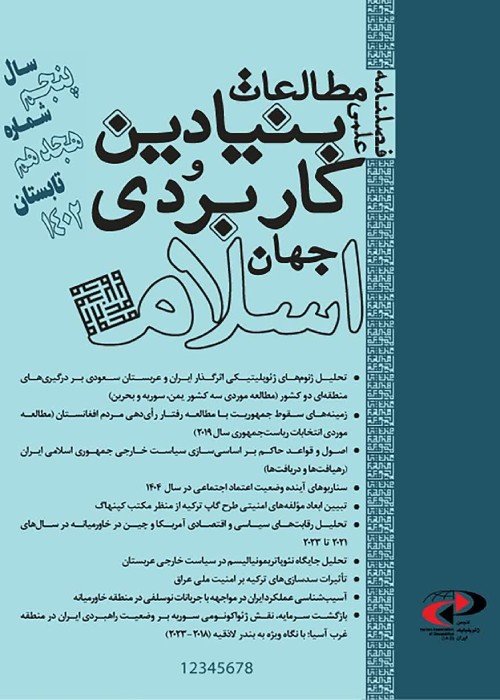Analysis of Saudi aggressive / active foreign policy on neoclassical realism perspective 2010-2020
Saudi Arabia has been known as one of the most important and influential countries in the Islamic world and the Middle East for its conservative approach to foreign policy, and has often been recognized as an actor who supports the status quo and opposes change. However, its behavior over the past decade in the regional arena indicates its transition from a conservative approach to a strong tendency towards an aggressive approach. Neoclassical realism analysis is a multilevel analysis that examines unit-level factors, government and macro-factors and offers a complete and appropriate theory of foreign policy by combining internal and external factors. For this reason, the authors claim that neoclassical realism provides a more coherent and appropriate theoretical framework for understanding Saudi foreign policy. In this regard, this article seeks to answer the question of how the behavior of Saudi Arabia's aggressive foreign policy in the last decade can be explained from the perspective of neoclassical realism, using the analytical-explanatory method and using library sources. Accordingly, the hypothesis of the article is that due to the changing domestic, regional and international conditions of Saudi Arabia; The foreign policy behaviors of this country have shifted from a conservative state to an aggressive and security-oriented behavior, and the domestic level has played an effective role in this transformation as well as the systemic and macro level. The results of the research confirm that the presence of multiple levels of change in the behavior of Saudi foreign policy has led to the continuation of approaches resulting from change. At the micro and national levels, the role of the third generation of Saudi leaders, especially the current Crown Prince Mohammed bin Salman, who has now become a major player in Saudi foreign policy has been so important in transforming Saudi foreign policy by adopting traditional domestic and foreign policies. The importance of leadership characteristics and the impact of new domestic political priorities on foreign policy behavior. In addition to the role of emerging Saudi leaders, the traditional role of ideology and neo-Wahhabism and the position of Saudi geoculture and the position of the two holy shrines in an effort to restore the leadership of the Islamic world and the role of financial revenues from increased oil sales in recent years and Saudi Arabia. As the largest producer and supplier of oil, he noted that it is very important in adopting an active Saudi foreign policy in the last decade. At the macro level, neoclassicists emphasize the rise of relative power, the influence and maximization of security as neorealists, and the balance of interests alongside the balance of power. According to this theory, countries are always seeking to increase and expand their relative power in order to influence the peripheral environment and beyond. The purpose of influence is to change the decisions of other countries in the direction of its own interests, and this influence usually results in shaping the regional security environment in a way that is in harmony with the interests of the influential country. Saudi Arabia invaded Yemen under its Arab League, intervened effectively in the Syrian crisis to secure its interests, formed an Arab coalition to change political relations with Qatar, both at the time of severing diplomatic relations and seeking to soften relations, and finally, in an effort to permanently balance relations with the Islamic Republic of Iran as its main rival and reduce its deeper influence in the region, it has always sought to maximize its power, security and interests, even at the cost of opposing or disregarding the wishes of its traditional strategically( America) to act. It seems that Saudi Arabia is trying to use the card of necessity of putting pressure on the Islamic Republic of Iran in the region in its relations with other supra-regional powers, including China, which is in line with China's Middle East policy of non-interference in its geopolitical rivalries. Iran, as a strategic partner and China's commitment to balancing relations with Iran and Saudi Arabia, does not seem to be successful. However, these efforts represent a fundamental shift in Saudi Arabia's foreign policy approach. On the other hand, it can be a proof that Saudi Arabia and Muhammad bin Salman intend to pursue their active and aggressive approach in order to ensure the maximum interests of Al-Saud and to promote Saudi leadership in the Islamic world in the future. Overall, Saudi Arabia's evolving and active approach to foreign policy over the past decade has several key components, resulting in a combination of levels of analysis influencing foreign policy behavior: first, pursuing the maximum interests of the Saudis and promoting Saudi Arabia's undisputed leadership in the Islamic world; Second, legitimizing Saudi policies and delegitimizing the behavior and approaches of rivals and enemies; Third, the lack of adherence to Saudi Arabia's foreign policy on the priorities of the United States' own traditional allied regions and the search for other powerful global allies looking east; Fourth, weakening the influence of the Islamic Republic of Iran in the region and trying to influence regional and supra-regional alliances and coalitions; And finally, maintaining and strengthening the position of the regions of Saudi Arabia and promoting it in the changing world order.
- حق عضویت دریافتی صرف حمایت از نشریات عضو و نگهداری، تکمیل و توسعه مگیران میشود.
- پرداخت حق اشتراک و دانلود مقالات اجازه بازنشر آن در سایر رسانههای چاپی و دیجیتال را به کاربر نمیدهد.



